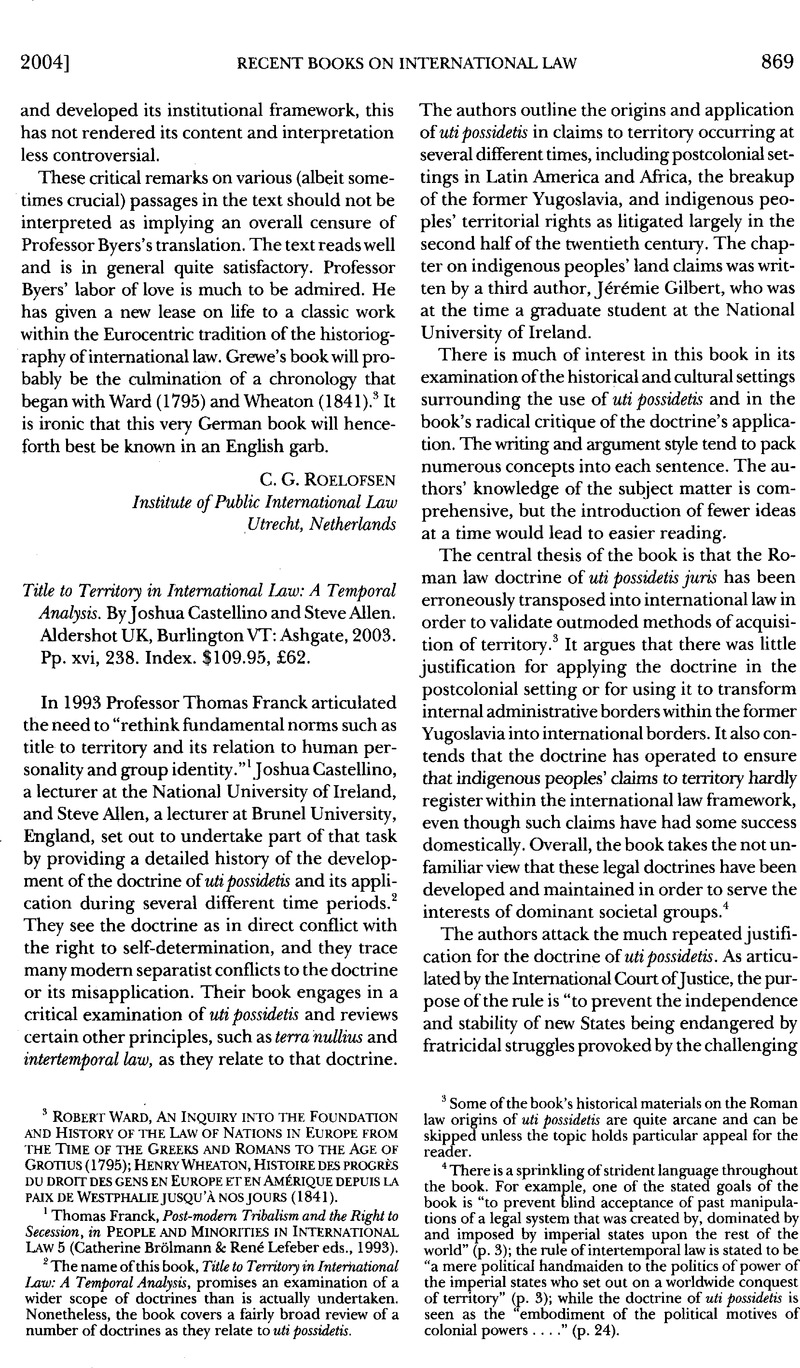No CrossRef data available.
Article contents
Title to Territory in International Law: A Temporal Analysis. By Joshua Castellino and Steve Allen. Aldershot UK, Burlington VT: Ashgate, 2003. Pp. xvi, 238. Index. $109.95, £62.
Published online by Cambridge University Press: 27 February 2017
Abstract

- Type
- Book Reviews and Notes
- Information
- Copyright
- Copyright © American Society of International Law 2004
References
1 Franck, Thomas, Post–modern Tribalism and the Right to Secession, in People And Minorities In International Law 5 (Catherine Brõlmann & Rene Lefeber eds., 1993)Google Scholar.
2 The name of this book, Title to Territory in International Law: A Temporal Analysis, promises an examination of a wider scope of doctrines than is actually under taken. None theless, the book covers a fairly broad review of a number of doctrines as they relate to uti possidetis.
3 Some of the book’s historical materials on the Roman Law origins of uti possidetis are quite arcane and can be skipped unless the topic holds particular appeal for the reader.
4 There is a sprinkling of strident language through out the book. For example, one of the stated goals of the book is “to prevent blind acceptance of past manipulations of a legal system that was created by, dominated by and imposed by imperial states upon the rest of the world” (p. 3); the rule of inter temporal law is stated to be “a mere political handmaiden to the politics of power of the imperial states who set out on a worldwide conquest of territory” (p. 3); while the doctrine of uti possidetis is seen as the “embodiment of the political motives of colonial powers. . . .” (p. 24).
5 Frontier Dispute (Burk. Faso/Mali), 1986 ICJ Rep.554, 566, para. 23 (Dec. 22).
6 Land and Maritime Boundary between Cameroon and Nigeria (Cameroon v. Nig.: Eq. Guinea Intervening),2001 ICJ Rep. 9 (Feb. 20). The failure to discuss this important and controversial decision is surprising, as the judgment was issued on October 10, 2002 Google Scholar, and the bookis listed as published in April 2003, but perhaps the publisher had a slow printing procedure.
7 Frontier Dispute (Burk. Faso/Mali), 1986 ICJ REP.554, 566, para. 23 (Dec. 22).
8 Id. at 565, para. 20.
9 Id. at 566, para. 23.
10 Land, Island and Maritime Frontier Dispute (Elsal./Hond.: Nicar. Intervening), 1992 ICJ Rep. 351, 396,para. 58 (Sept. 11).
11 The discussion of the Canadian Supreme Court’s advisory opinion on the legality under domestic and international law of any claim to secession by Quebec is not helpful, as it appears to misunderstand the scope of the court’s remit, which was only to consider sećession, not dissolution. Nor is there anything in the opinion but a passing reference to future boundaries or “aboriginal interests.” Reference re Secession of Quebec, [1998] 2S.C.R. 217, para. 13.
12 See, e.g., Williams, Paul & Heymann, Karen, Earned Sovereignty: An Emerging Conflict Resolution Approach, 10Ilsa J. Int’l & Comp. L. 422 (2004)Google Scholar.




